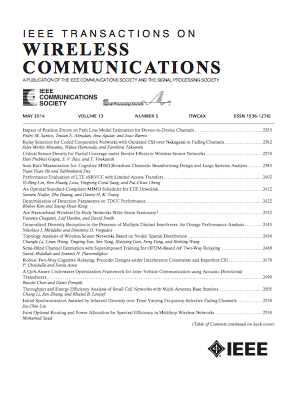Two-Timescale Synchronization and Migration for Digital Twin Networks: A Multi-Agent Deep Reinforcement Learning Approach
IF 8.9
1区 计算机科学
Q1 ENGINEERING, ELECTRICAL & ELECTRONIC
引用次数: 0
Abstract
Digital twins (DTs) have emerged as a promising enabler for representing the real-time states of physical worlds and realizing self-sustaining systems. In practice, DTs of physical devices, such as mobile users (MUs), are commonly deployed in multi-access edge computing (MEC) networks for the sake of reducing latency. To ensure the accuracy and fidelity of DTs, it is essential for MUs to regularly synchronize their status with their DTs. However, MU mobility introduces significant challenges to DT synchronization. Firstly, MU mobility triggers DT migration which could cause synchronization failures. Secondly, MUs require frequent synchronization with their DTs to ensure DT fidelity. Nonetheless, DT migration among MEC servers, caused by MU mobility, may occur infrequently. Accordingly, we propose a two-timescale DT synchronization and migration framework with reliability consideration by establishing a non-convex stochastic problem to minimize the long-term average energy consumption of MUs. We use Lyapunov theory to convert the reliability constraints and reformulate the new problem as a partially observable Markov decision-making process (POMDP). Furthermore, we develop a heterogeneous agent proximal policy optimization with Beta distribution (Beta-HAPPO) method to solve it. Numerical results show that our proposed Beta-HAPPO method achieves significant improvements in energy savings when compared with other benchmarks.数字孪生网络的双时标同步和迁移:多代理深度强化学习方法
数字孪生(DTs)已成为表示物理世界实时状态和实现自持系统的一种前景广阔的工具。在实践中,移动用户(MU)等物理设备的数字孪生通常部署在多接入边缘计算(MEC)网络中,以减少延迟。为确保 DT 的准确性和保真度,MU 必须定期将其状态与 DT 同步。然而,MU 的移动性给 DT 同步带来了巨大挑战。首先,MU 移动会引发 DT 迁移,从而导致同步失败。其次,MU 需要与其 DT 频繁同步,以确保 DT 的保真度。然而,MEC 服务器之间由 MU 移动引起的 DT 迁移可能不会频繁发生。因此,我们通过建立一个非凸随机问题来最小化 MU 的长期平均能耗,从而提出了一个考虑可靠性的双时标 DT 同步和迁移框架。我们利用李亚普诺夫理论转换可靠性约束,并将新问题重新表述为部分可观测马尔可夫决策过程(POMDP)。此外,我们还开发了一种采用 Beta 分布的异构代理近端策略优化(Beta-HAPPO)方法来解决该问题。数值结果表明,与其他基准相比,我们提出的 Beta-HAPPO 方法在节能方面取得了显著改善。
本文章由计算机程序翻译,如有差异,请以英文原文为准。
求助全文
约1分钟内获得全文
求助全文
来源期刊
CiteScore
18.60
自引率
10.60%
发文量
708
审稿时长
5.6 months
期刊介绍:
The IEEE Transactions on Wireless Communications is a prestigious publication that showcases cutting-edge advancements in wireless communications. It welcomes both theoretical and practical contributions in various areas. The scope of the Transactions encompasses a wide range of topics, including modulation and coding, detection and estimation, propagation and channel characterization, and diversity techniques. The journal also emphasizes the physical and link layer communication aspects of network architectures and protocols.
The journal is open to papers on specific topics or non-traditional topics related to specific application areas. This includes simulation tools and methodologies, orthogonal frequency division multiplexing, MIMO systems, and wireless over optical technologies.
Overall, the IEEE Transactions on Wireless Communications serves as a platform for high-quality manuscripts that push the boundaries of wireless communications and contribute to advancements in the field.

 求助内容:
求助内容: 应助结果提醒方式:
应助结果提醒方式:


